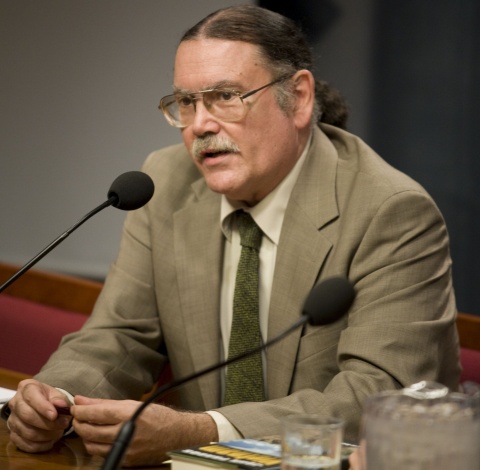Columbia College | Columbia University in the City of New York
John Prados ’73, Excavator and Interpreter of Declassified Documents

Prados devoted his scholarly career to ferreting out government secrets because, as he told The New York Times, “The American people not only have a need but a right to know their history.”
Prados was a senior fellow at the National Security Archive, a research institute at The George Washington University, for the last 25 years. In announcing his passing, the organization described him as “the ultimate prospector in the gullies of the documentary gold rush.” Thomas S. Blanton, president of the National Security Archive, said Prados “almost invented and certainly personified the identity of an independent scholar. He was an archives rat, the ultimate prospector in the primary-source gold mine.”
A self-described product of the 1960s, Prados certainly looked the part of the antiwar activist with his ponytail and bushy mustache. His professional career was shaped by the turmoil of the 1970s, when protests and questioning of government and its leaders became commonplace.
Prados was a history major when the Watergate affair began to unfold. He earned his first graduate degree, an M.A. in political science from GSAS, in 1975, when Saigon fell to communist forces, marking the end of the Vietnam War. He subsequently earned an M.Phil in 1977 and a Ph.D. in 1982, both in political science from GSAS.
Prados examined the extent of Soviet strategic forces during the Cold War in his dissertation, which became his first book, The Soviet Estimate: U.S. Intelligence Analysis and Russian Military Strength (1982). He revisited the period in several other volumes, including How the Cold War Ended: Debating and Doing History (2011).
He explored the Pacific theater of WWII in Combined Fleet Decoded: The Secret History of American Intelligence and the Japanese Navy in World War II (1995), and said his goal was to “reassess the outcomes of battles and campaigns in terms not just of troops or ships but of how the secret war played out.” One of Prados’ best-known books was Vietnam: The History of an Unwinnable War, 1945–1975 (2009), which historian Arthur Herman described in The Wall Street Journal as “a detailed picture of a U.S. government unwilling to confront its mistakes and an American military baffled by a guerrilla insurgency.”
The intelligence community was a frequent subject of Prados’ probing. He wrote about the National Security Council in Keepers of the Keys: A History of the National Security Council from Truman to Bush (1991) and the CIA in Safe for Democracy: The Secret Wars of the CIA (2006) and The Ghosts of Langley: Into the CIA’s Heart of Darkness (2017).
Prados was also an award-winning designer of more than 30 board games set amid historical events including the Napoleonic wars, the Civil War, WWII and the Vietnam War. His “Rise and Decline of the Third Reich,” released in 1974, became one of the most popular strategy games of its kind and won a Charles S. Roberts Award (aka a “Charlie”), the top honor in historical war game design.
Recognizing the link between his archival work, which is based on history, and his creation of board games, which give players an opportunity to change history, Prados said he did not want his games to encourage militarism but rather to reveal “the difficulty of conducting war” and its “horrendous costs.”
Prados was born in Queens on January 9, 1951. When he was in middle school, his family moved to Puerto Rico, where his father was born and where he managed an athletics stadium. Prados’ mother was from Kansas and taught English. At one point Prados hoped to attend the U.S. Military Academy at West Point, and he told The Washington Post, “War games and my whole interest in the subject is a sublimation of that.”
Prados’ marriage to Jill Gay ended in divorce. He is survived by his partner of 25 years, Ellen Pinzur; daughters, Dani and Tasha; brother, Joe; and sister, Mary.
— Alex Sachare ’71
Issue Contents
Published three times a year by Columbia College for alumni, students, faculty, parents and friends.
Columbia Alumni Center
622 W. 113th St., MC 4530, 6th Fl.
New York, NY 10025
212-851-7852
cct@columbia.edu
Columbia Alumni Center
622 W. 113th St., MC 4530, 4th Fl.
New York, NY 10025
212-851-7488
ccalumni@columbia.edu

